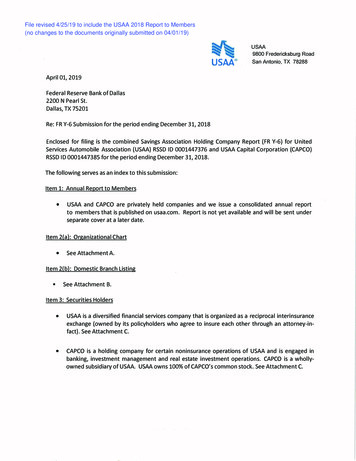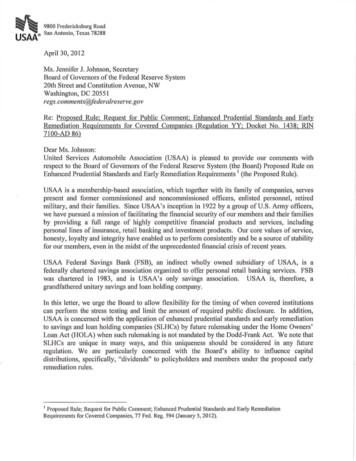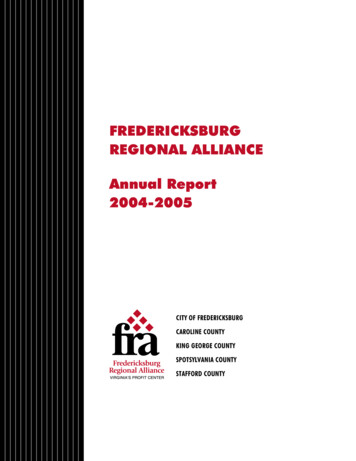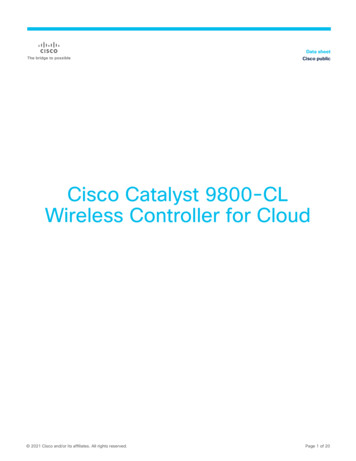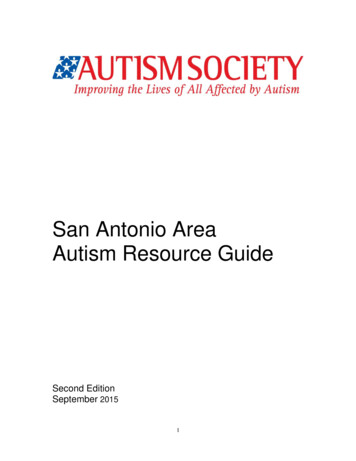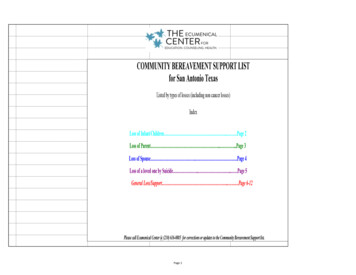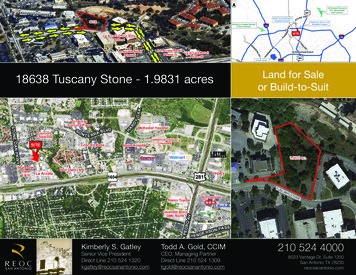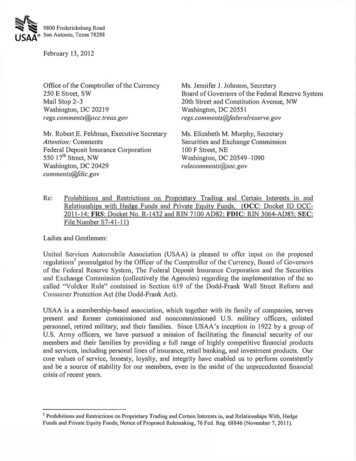
Transcription
USAA9800 Fredericksburg RoadSan Antonio, Texas 78288February 13, 2012Office of the Comptroller of the Currency250 E Street, SWMail Stop 2 - 3Washington, DC 20219regs.comments@occ.treas.govMs. Jennifer J. Johnson, SecretaryBoard of Governors of the Federal Reserve System20th Street and Constitution Avenue, NWWashington, DC 20551regs.comments@federalreserve.govMr. Robert E. Feldman, Executive SecretaryAttention: CommentsFederal Deposit Insurance Corporation550 17th Street, NWWashington, DC 20429comments@fdic.govMs. Elizabeth M. Murphy, SecretarySecurities and Exchange Commission100 F Street, NEWashington, DC 20549-1090rulecomments@sec.govRe:Prohibitions and Restrictions on Proprietary Trading and Certain Interests in andRelationships with Hedge Funds and Private Equity Funds. (OCC: Docket ID OCC2011-14; FRS: Docket No. R-1432 and RIN 7100 AD82; FDIC: RIN 3064-AD85; SEC:File Number S7-41-11Ladies and Gentlemen:United Services Automobile Association (USAA) is pleased to offer input on the proposedregulations. footnotepromulgated1.by the Officer of the Comptroller of the Currency, Board of Governorsof the Federal Reserve System, The Federal Deposit Insurance Corporation and the Securitiesand Exchange Commission (collectively the Agencies) regarding the implementation of the socalled "Volcker Rule" contained in Section 619 of the Dodd-Frank Wall Street Reform andConsumer Protection Act (the Dodd-Frank Act).USAA is a membership-based association, which together with its family of companies, servespresent and former commissioned and noncommissioned U.S. military officers, enlistedpersonnel, retired military, and their families. Since U S A A ' s inception in 1922 by a group ofU.S. Army officers, we have pursued a mission of facilitating the financial security of ourmembers and their families by providing a full range of highly competitive financial productsand services, including personal lines of insurance, retail banking, and investment products. Ourcore values of service, honesty, loyalty, and integrity have enabled us to perform consistentlyand be a source of stability for our members, even in the midst of the unprecedented financialcrisis of recent years.Prohibitions and Restrictions on Proprietary Trading and Certain Interests in, and Relationships With, HedgeFunds and Private Equity Funds; Notice of Proposed Rulemaking, 76 Fed. Reg. 68846 (November 7, 2011).endoffootnote.
Page 2provided comments to the Financial Stabilitystudy regarding the VolckerRule. We appreciate the Agencies' review of our letter. The proposed regulations appear tolargely satisfy our concerns, with the exception of investment by insurance subsidiaries, which isaddressed in Part B below.In a l e t t e r d a t e dNovember5,2 0 1 0 .footnote2.,USAAO v e r s i g h t C o u n c i l in r e s p o n s e t o t h e r e q u e s t f o r p u b l i ci n p u t .footnotefor 3.itsIn response to the proposed regulations, we are aware that the Agencies have received commentletters that argue that the Volcker Rule's so-called "insurance exemption" applies to both theproprietary trading restrictions (Subpart B of the proposed regulations) and also to theinvestment restrictions (Subpart C of the proposed regulation). We concur with this assessmentand support the related changes to the regulations espoused by these comment letters. Wesubmit this separate letter to address investments in covered funds (Part A), real estateinvestment vehicles (Part B), state tax credit programs (Part C) and by non-profit foundationssponsored by banking entities (Part D).A. Apply the insurance exemption to investment in covered funds (Question 135).Section 13(d)(1)(F) of the Volcker Rule essentially states that, in spite of the prohibitions onproprietary trading and investment in private equity and hedge funds, insurance companies maytransact in any security, provided that the transaction is solely for the general account of theregulated insurance company (the "insurance exemption"). Interests in private equity and hedgeand,f u n d s ( w h i c h t h e p r o p o s e d r e g u l a t i o n h a s t e r m e d " c o v e r e d f u n d s " ) a r c" s e c u r i t i e s " ' .footnote4.therefore, clearly fall under the plain language of the insurance exemption. The fact that thephrase "any security" is found by cross reference to the definition of proprietary trading inSection 13(h)(4) should not limit the insurance exemption to only proprietary trading. Therefore,the covered funds prohibition in Subpart C, Section.10(a) of the proposed regulation shouldreflect that investment in private equity and hedge funds by insurance companies for the generalaccount is a permitted activity under Section 13(d)(1)(F) of the Volcker Rule.This interpretation is not only consistent with the language of the statute itself, but is also inharmony with the Volcker Rule mandate that the Financial Stability Oversight Council (FSOC)conduct a study and make recommendations on implementing the Volcker Rule so as to"appropriately accommodate the business of insurance." Thus, the Volcker Rule explicitlysupports a regulatory regime that accommodates, rather than limits, the business of insurance—akey element of which is investing premiums paid by policyholders to pay future claims andrelated expenses. In its study, the FSOC recognized that this investment activity is a centralcomponent of the insurance business and that application of the Volcker Rule could be undulydisruptive to the insurance industry.footnote5.Letter from Steven Alan Bennett, General Counsel, U S A A , to Financial Stability Oversight Council, Departmentof Treasury (November 5, 2010), available at http:/www.regulations.gov/#!documentDetail;D FSOC-2010-00021364.endoffootnote.Public Input for the Study Regarding the Implementation of the Prohibitions on Proprietary Trading and CertainRelationships with Hedge F u n d s and Private Equity Funds; Notice and Request for Information 75 Fed. Reg. 61758(October 6, 2010).endoffootnote.See 15 U.S.C. 7 7 b ( a ) ( l ) .endoffootnote.Study & Recommendationson Prohibitions on Proprietary Trading & Certain Relationshipswith Hedge Funds &Private Equity Funds, Financial Stability Oversight Council, January 2011 at 71.endoffootnote.
Page 3Moreover, one key objective of the Volcker Rule was to promote the safety and soundness ofbanking entities and U.S. financial stability. Prohibiting insurance company investment incovered funds docs not further this objective. Unlike investments by banks, insurance companyinvestment in covered funds is already subject to strict limitations contained in state insuranceinvestment statutes and oversight by state insurance regulators. Those state restrictions governthe types of covered fund investments insurance companies can make, as well as the quantity ofinvestments in covered funds available to insurance companies. As such, there arc protections inplace to ensure that the investments arc prudent and serve to diversify the insurance companyinvestment portfolio without creating inappropriate risk for the solvency of the insurancecompany. In addition, covered funds constitute important investment vehicles for insurancecompanies, providing diversification and relatively higher rates of return that enable insurancecompanies, like USAA, to maintain affordable premiums and pay dividends to our members the men and women of the U.S. military and their families.Insurance companies strive to keep the cost of insurance low for customers by, among otherthings, investing premium dollars in diverse, conservative, stable investment vehicles aspermitted by state law. Unnecessarily limiting investment opportunities will impair the ability ofinsurance companies to adapt to changing market conditions and could result in increases ininsurance premiums. In addition, prohibiting certain insurance companies (i.e., those that meetthe definition of banking entity in the proposed regulation because they happen to be affiliatedwith banks) from accessing certain investment opportunities would create a competitiveimbalance within the insurance industry. An insurance company with the flexibility to accessadditional prudent diversification opportunities with their accompanying higher rates of returncan offer lower premiums and, as a result, attract a greater market share. Strong insuranceoperations have a positive impact on not only the insurer but also the depository institution itsupports. We therefore urge the Agencics to put all insurance companies on a level playing fieldby applying the insurance exemption to the covered funds prohibition in Section.10(a).B. Clarify that an investment "solely" for the general account of the insurancecompany includes investments through affiliated real estate investment vehicles tobenefit the general account (Question 132).Section .6(c)(2) of the proposed regulation provides that the prohibition on proprietary tradingdoes not apply to the purchase or sale of a covered financial position by an insurance companynor by any affiliate if it is made "solely for the general account of the insurance company." TheVolcker Rule calls for the proposed regulations to accommodate the business of insurance andexpressly permits an investment if it is conducted in compliance with insurance companyinvestment laws.USAA is regulated by the Texas Department of Insurance, which governs and regulates USAA'sinvestments. In compliance with Texas insurance investment laws, as part of its investmentstrategy, USAA invests a portion of its insurance portfolio in commercial real estate - sometimesdirectly and sometimes through affiliated real estate investment vehicles. Such structures allowUSAA to invest in diversified asset classes while prudently managing risks and protecting theassets of the insurance company.
Page 4Such investments in real estate investment vehicles neither affect the depository institution norcreate additional regulatory risks; therefore, the Volcker Rule should not be implicated. Werequest that the Agencies clarify that an insurance company's direct or indirect investment in anaffiliate, which in turn invests in real estate, as permitted by state insurance laws, does not runafoul of the "solely for the general account" language in Section.6(c)(2) of the proposedregulations. And, as discussed in Part A above, we request that the Agencies clarify that theinsurance exemption extends to real estate investment vehicles that may otherwise meet thedefinition of covered funds (Subpart C of the proposed regulation).C. The Small Business Investment Companies (SBIC), public welfare and qualifiedrehabilitation investment exemptions for acquiring or retaining an ownershipinterest in a covered fund are too narrow (Questions 276-280).Section.13(a)(1) of the proposed rule purports to exempt (i) investments in support of SBIC,(ii) "public welfare" investments that impact low to moderate income families, housing andcommunities and (iii) qualified rehabilitation expenditure with respect to a qualifiedrehabilitation building or certified historic structure from the prohibitions on acquiring orretaining an ownership interest in and having certain relationships with a covered fund found inthe Volcker Rule. We believe these limited exemptions are too narrow. Many states havedeveloped statutes that authorize tax credits (e.g., tax credits against state premium taxes paid byinsurance companies) for investment in various programs that support a state identified publicw e l f a r e p u r p o s e .footnote6. public welfare purposes chosen by the states are not limited to ruleThe§ .13(a)(1) investments (SBIC, low income public welfare or qualified rehabilitationinvestments), but also include other investments such as renewable energy development, hightechnology innovation and urban redevelopment. Many of these state supported programsqualify for federal tax credits as well.These state tax credit investments are beneficial not only because they provide an attractivereturn on a relatively low-risk investment by providing a credit against taxes owed, but alsobecause they support various public welfare initiatives of the states. In short, there is nomeaningful distinction between these other kinds of state supported public welfare investmentsand the identified rule § .13(a)(1) investments (SBIC, low income public welfare or qualifiedrehabilitation investments). Thus, the exemption should be expanded to include all suchinvestments. We propose expansion of the exemption in § .13(a)(1) to allow investment by abanking entity in any state promulgated tax credit program. Please note that applying theinsurance exemption to investments in covered funds, as contemplated by the Volcker Rule,would also allow for insurance company investment in such tax credit programs.D. Private foundations should not be included within the definition of banking entity(Question 6).USAA sponsors The USAA Foundation and The USAA Educational Foundation, two non-profitorganizations. The USAA Foundation's purpose is to improve communities by contributing toother qualified nonprofit organizations that provide programs for various areas of public welfareincluding education, health and human services, medical research and support of the military.See, e.g., Hawaii Revised Statutes,§105-129.15 etseq.endoffootnote.§235-110.9,241-4.8 and 431:7-209,Fla. Stat. §288.991et seq. andNCGS
Page 5The mission of The USAA Educational Foundation is to help consumers make informeddecisions by providing information on financial management, safety concerns and significant lifeevents. The primary programs offered by The USAA Educational Foundation are a publicationslibrary, educational videos, and a Financial Management Presentation offered to ROTC cadetsand military audiences. All publications are provided to consumers free of cost. Neither TheUSAA Foundation nor The USAA Educational Foundation endorses or promotes anycommercial supplier, product or service.The definition of "affiliate" in §2(1) of the Dodd Frank Act is so broad that non-profit privatefoundations sponsored by a banking entity, as defined in the Volcker Rule, could bemisconstrued as coming within the scope of the Volcker Rule and its restrictions. Thisinterpretation has unintended results and is inconsistent with the purpose of the statute. TheVolcker Rule's restrictions against proprietary trading and investing in covered funds should notapply to private foundations, regardless of whether they are sponsored by a banking entity. Thesole purpose of these foundations is to promote the public welfare. Further to that purpose, strictIRS rules pursuant to Section 501(c) of the Internal Revenue Code of 1986 (as amended) prohibitany financial benefit of the foundation from inuring to the sponsoring bank entity as a conditiont o t a xe x e m p t i o n .footnote7.Moreover,the IRS has well established rules that prohibit investments by af o u n d a t i o n t h a t u n r e a s o n a b l y j e o p a r d i z e t h e a s s e t s o f t h ef u n d .footnote8.Dueto unprecedented lowreturns on traditional investments (e.g., stocks and bonds), alternative assets are rapidlybecoming a significant portion of many foundations' long term investment strategies. Funds thatmeet the definition of covered funds are a common vehicle for investing in this class of assets. IfVolcker Rule restrictions were to apply to private foundations, they would be hampered orprevented from investing in covered funds, thereby reducing overall returns for such foundationsand decreasing the amount of contributions foundations could make to promote public welfare.Therefore, non-profit private foundations should be clearly excluded from the definition of"affiliate" for purposes of the Volcker Rule.USAA recognizes the tremendous effort that went into drafting the proposed regulations and ispleased to have the opportunity to provide comments.We appreciate the Agencies'consideration of our comments and look forward to working with the Agencies on issues relatedto the Volcker Rule and other components of the Dodd-Frank Act. Should you have questions orwish further clarification on our comments, please contact Ken Smith, Corporate Finance andGovernance Counsel, at 210-498-0616.Sincerely. signed.Steven Alan BennetExecutive Vice PresidentGeneral Counsel & Corporate SecretarysInternal Revenue Code (I.R.C.) § 4941; Treas. Reg. § 53.4941(a)-1 et seq.endoffootnote.I.R.C. § 4944; Treas. Reg. § 53.4944-1 et seq.endoffootnote.
USAA . 9800 Fredericksburg Road San Antonio, Texas 78288 . February 13, 2012 . Office of the Comptroller of the Currency 250 E Street, SW . Mail Stop 2-3 Washington, DC 20219 . . USAA is regulated by the Texas Department of Insurance, which governs and regulates USAA's investments. In compliance with Texas insurance investment laws, as part .

